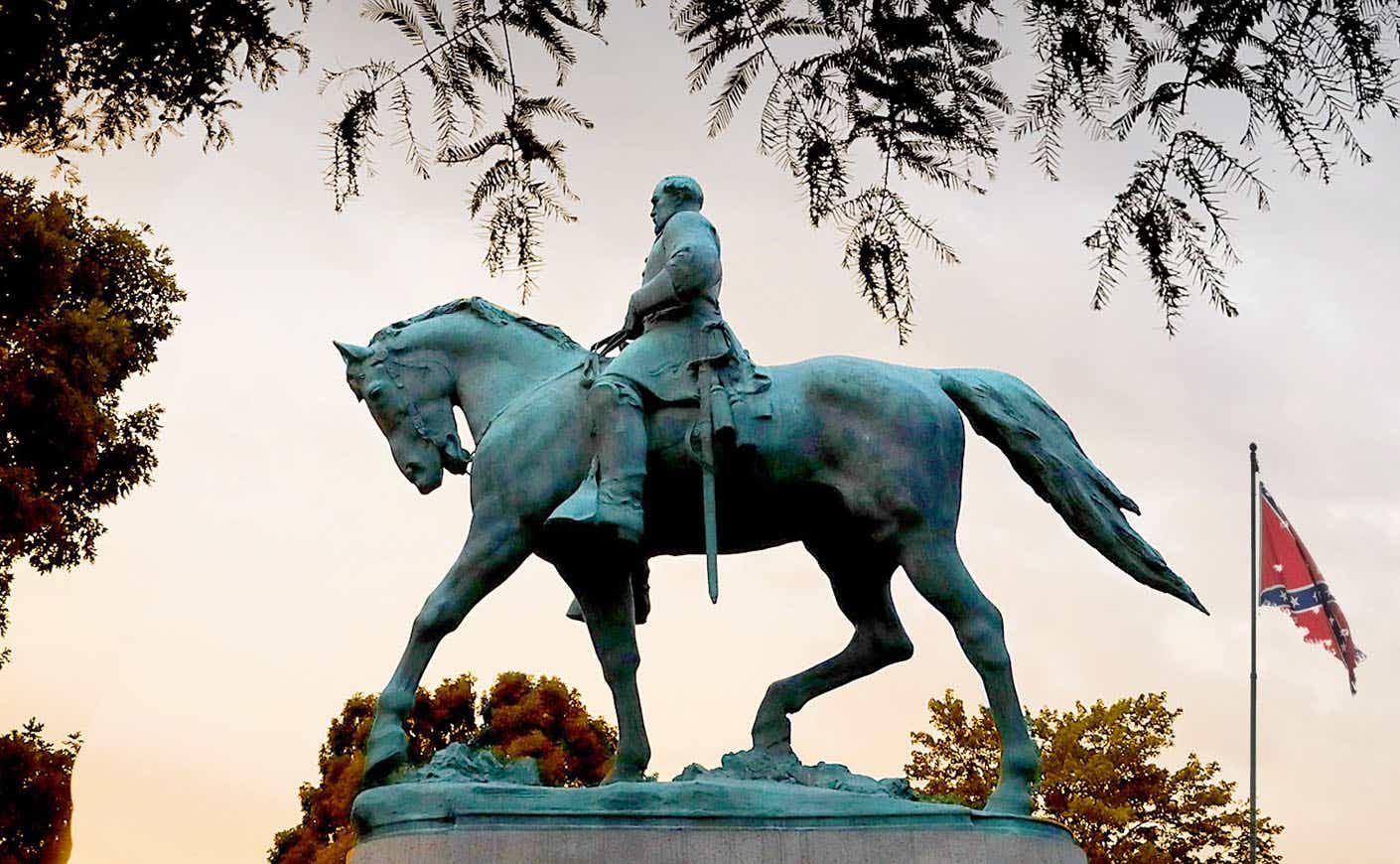As a church-going boy growing up in Alexandria, Virginia, Ty Seidule revered Robert E. Lee above all else. “I grew up believing that on a scale of one to 10, Lee was an 11,” he told KCM. “Jesus would have been about a five.”
Though his view of Lee and the Confederacy has radically changed. Seidule, who served in the Army for 36 years and has taught history at West Point, says he now sees Lee for what he was — a man who “chose treason” because of his commitment to human enslavement — and the Lost Cause of the Confederacy as a myth perpetuated to enforce white supremacy.
The revelation felt like a “gut punch” to him, but he said people have a responsibility to “engage with the facts, and the facts will lead you to a very different place.”
His new book, Robert E. Lee and Me, is part memoir and part historical account. He examines how the myth of the Lost Cause came to be, how it seeped into Southern culture and how damaging these lies have been for the country. He also charts his own change of heart, culminating in his advocacy to strip Confederate names from Army bases.
KCM spoke to Seidule about the book, how the Lost Cause became entwined with the Southern identity and how to unravel the myth.
KCM: Can you tell us what drove you to write this book?
Seidule: I had taught at West Point for a number of years and was in charge of the memorialization committee. In 2012, West Point was going to add a new memorial room for the 1,500 graduates who died serving the nation from 1812 to the present. And the question was, should there be Confederate names going in? I argued strenuously that they should not. And I lost. The college president at the time said we need to bring people together.
I was so upset about this that I went back and talked to my wife. And she said, "Ty, nobody knows why this is so important to you. You’re hiding your own past."
And that is so true. I grew up believing that on a scale of one to 10, Lee was an 11. And even though I went to church every Sunday, I believe Jesus would have been about a five. So I had a reverential view of Lee and obviously that changed. I started telling my story because maybe I could convince other people, not just with the facts — because the facts didn’t work; it couldn’t penetrate through their culture. But maybe my own story would help convince them.
This book feels very timely, considering the kind of racial reckoning that’s unfolded throughout the country. Was there any moment recently that made you stop and say, this is a good time to share my story?
On Jan. 6, when I saw the flag of treason in the U.S. Capitol — and that’s the Confederate flag to me — went by a portrait of Charles Sumner, the great abolitionist who was nearly caned to death on the floor of the Senate by a South Carolinian because he excoriated the enslavers. And that Charles Sumner is the one who wrote the oath of office that I took as an Army officer, that everyone in Congress took.
He wrote it in 1862 and it says I promise to support and defend the Constitution of the United States against all enemies foreign and domestic. That oath is an anti-Confederate oath and yet here was the flag of treason by that great American. It enraged me.
So let’s talk a bit about your thesis. In your book, you look to unravel the myth of the Lost Cause, which recasts the Confederacy’s defeat as a story of American heroism. Can you talk us through why this myth was created and how it’s been able to endure?
Before the smoke even clears on the battlefield, Robert E. Lee tries to come to grips with why they lost. And what he says is that the Confederacy lost because of overwhelming material, manpower and money from the North. He says the South fought honorably, it was for an honorable cause and the North had all this immigrant labor and they had these butcher generals. That started the Lost Cause myth.
But then the Lost Cause becomes something different. It becomes a way for white people to maintain political power in the South. Some of the elements of the myth are that the war was fought over state’s rights, not over slavery. That’s not true. It said that enslaved people were happy, which is just an abomination. The Lost Cause said that Reconstruction, which was an attempt to create a more equal society, was a failure because Black people weren’t ready for the vote or to serve in high office. And yet, they did serve in high office — 2,000 Black men served honorably. It said that Ulysses S. Grant was a butcher and drunk, and that Robert E. Lee was the greatest soldier, the finest man who ever lived.
The purpose of these myths is just like the purpose of Confederate monuments and Jim Crow legislation. It’s to support white supremacy to enforce white political power.

What are some of the ways this myth has been perpetuated?
One you may not realize is textbooks. My textbook at my school in Alexandria, Virginia said that the enslaved were happy in their condition. This was written in 1964, and I got it in the '70s. It said that slavery was a social security system, which was a falsehood meant to fight against integration, against equal rights.
The Confederate monuments too were right in front of the courthouse. Any Black person going in there would have to go by these. And remember, the only reason they’d go into the Courthouse was as a defendant. Because the South of my birth was a racial police state, and the Lost Cause myth served as the ideology to support it.
Do you think there’s been some progress made in terms of dismantling these structures?
I do. I was so excited to see our elected representatives pass the National Defense Authorization Act and then override President Trump’s veto. That will create a commission which will change the names of the 10 bases named after Confederates, who were just execrable people. John Brown Gordon, who has a base named after him in Georgia, was a Grand Dragon of the KKK.
I’m very happy to see that that’s changing. I’m happy to see some monuments to white supremacy going down and schools changing their names.
I love my country, and the reason why I criticize my country is because I’m a patriot. I’m so happy to see that our nation is changing its view of the Confederates and of white supremacy.
Being from the South, have you had conversations with friends and family about the myth of the Lost Cause and how damaging it is? And what advice would you give to people who want to start talking about this with their loved ones?
I certainly have. And there are a lot of people who disagree with me. When I have talked to people, I’ve tried to think through my own experience. I grew up believing these lies, and millions of other people grew up with these lies as well. So I have complete sympathy for growing up with that. But you’ve got to engage with the facts, and the facts will lead you to a much different place.
I try to do that, and I try to be humble and say, listen I was like this too. But it’s wrong. It’s wrong because it enforces a society that is not American. It’s not just.
So I think you have to be honest, you have to have the evidence and you have to show compassion to people. But you can’t give up and just because people disagree with you, stop talking.
Why do you think setting the record straight on the Lost Cause is such an emotionally charged and explosive issue for so many?
Because history is dangerous, it challenges your myths and your identities. And I promise you that when you challenge somebody’s identity, they react ferociously. Because this is how they view themselves and view the world. And you’re telling them that the myths and identity that they grew up with, particularly for white Southerners, has a foundation of racism. And that strikes to people. It hits them in the gut. It’s a gut punch. It was a gut punch to me.
Because of that, unless you look at it like a historian and do your own research, you won’t believe it. You’ll react violently against it. We see that with people at the insurrection on the Capitol, we see that with people carrying the Confederate flag, we see that with people making racist comments.
I’m attacking people’s identity, and their myths and they react against that.
This interview has been edited and condensed.
Written and reported by Rachel Uda.









